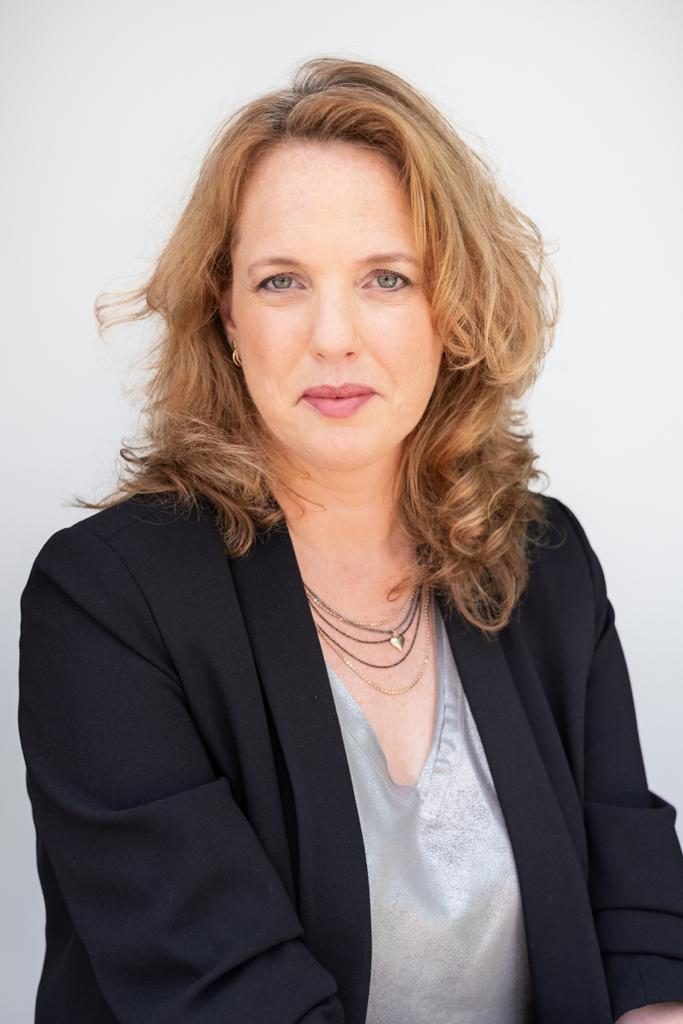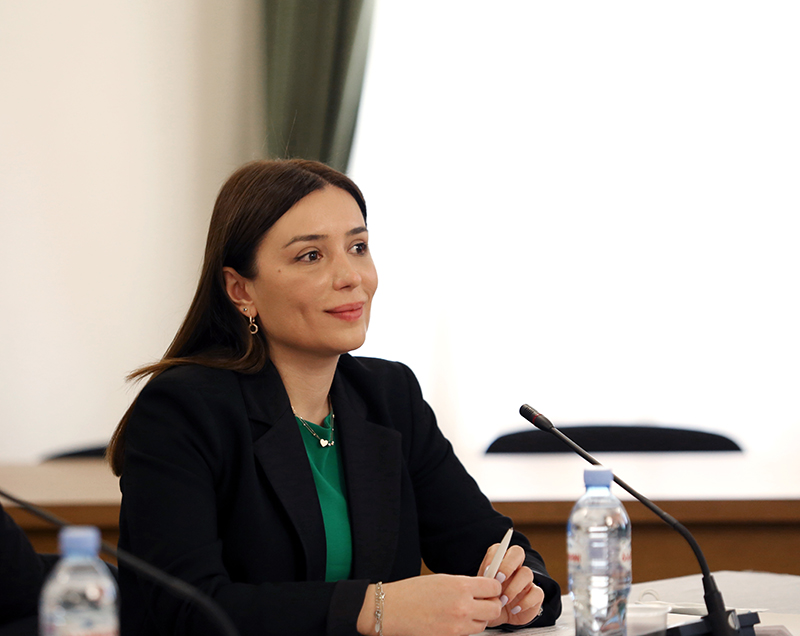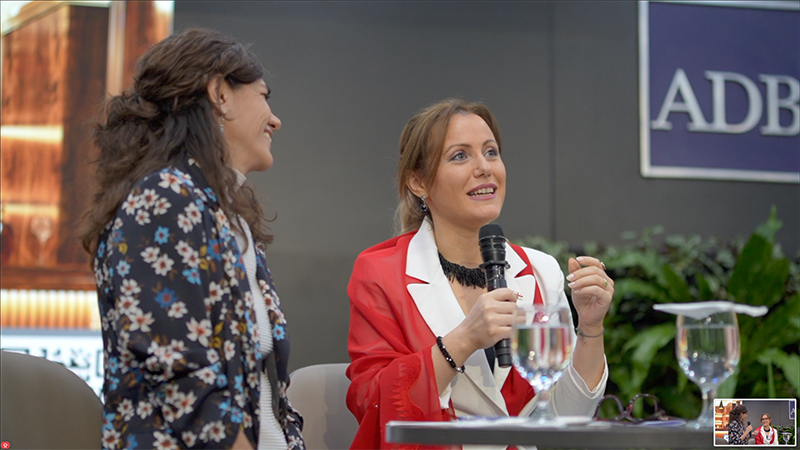Ambassador of SDG 6 – Clean Water and Sanitation
Former Ambassador Extraordinary and Plenipotentiary of Israel to Georgia, Hadas Ester Meitzad

Hadas Ester Meitzad
The Israeli government has been working very actively in Georgia and throughout the world to support SDG 6: Clean Water and Sanitation. How can we achieve affordable, clean and safe water and sanitation across the globe?
I will start by saying that I’m personally very happy to speak about the SDGs. Back in 2014-2015, I was part of the Israeli mission to the UN, and my job was actually to negotiate on the SDGs on behalf of the State of Israel. There were many arguments, as one can assume when the whole UN was trying to agree on the 17 development goals. There were many long, white nights, and also, there were some questions about whether these SDGs, this very ambitious agenda, will end up being something that the world will take upon itself, will own, or will it remain something, you know, only in the bubble of the UN, diplomats, NGOs that are already working hard, and I think that this is very, very important.
I’m very happy because I think that the SDGs have become something well-known that kids are learning about in school, that there is a relatively high level of awareness. I’m very glad, and I think the role of industry and the business sector are very important when we are talking about the SDGs.
I’m also happy to speak specifically about SDG 6 because water is a significant issue for Israel. One of the previous Prime Ministers of Israel, many, many years ago, Levi Eshkol, once said that water for a country is like blood for human beings because this is how we see it. Israel and Georgia are very different when it comes to water. While Georgia has been blessed with lots of water, Israel has a very different climate. And in many cases, we have already experienced a water crisis that is now very much discussed. It forced us to develop a lot of solutions that have to do with efficient water management, education, and legislation and to invent a lot of technology to support all of them.
So back to your question. What I will say is I can speak a little bit about the Israeli experience, and I think this will be my best answer for you about the key factors to ensuring the availability and sustainability of water management. So I will say, for those who don’t know, that Israel originally was almost 60% desert. Now this percentage is lower because we managed to reverse the process of desertification to make the desert bloom. But this was how we started, with a semi-arid climate, a lot of desert and very limited energy and water resources. We took several steps: legislation, education and innovation. So legislation – there is a water law in Israel which declares that water is a national resource and it should be managed and handled by the government. There is one authority, the water authority, which is a governmental agency, and they are the ones who manage everything. And the management also includes precise measurements. In Israel, we know exactly how much water is coming in, the supply, and the demand for agriculture, domestic use, and industry. And this is a key factor in order to plan.
The second part is planning in advance. When we faced the water crisis in the 90s, a big part of it was to start planning solutions like desalination, recycling and reusing saline water and sewage to use it again. So this was one part. The third part is education. In Israel, the public has been educated, not to say brainwashed, about the importance of water and how important it is to be efficient. Just to give a few examples: when you grow up in Israel, you constantly see TV commercials about how ‘Israel is drying’. Every kid can quote, ‘Save every drop’. This was like a national slogan. You learn that you cannot water your garden in the middle of the day because of the heat and evaporation. You will see if you visit Israel, the sprinklers working during the nighttime. I’m not saying it’s not allowed, it’s not the law, but it is for us – it’s a mindset. You won’t see people washing cars with a water hose, but only with buckets. When you are soaping the dishes, we close the tap. I’m always joking that I know who is an Israeli – if you see a pipe leakage, there will be a physical reaction for us because we grew up learning all the time that water is a resource that constantly needs to be saved.
You talked about how you do things in Israel, but it would be good to also speak about what is happening here in Georgia. We are now preparing a new Water Resource Management law, which will ensure accessibility to clean water and also effective water management. What is the current situation in Georgia regarding accessibility to clean water? And what are the challenges we face?
There are better experts than me to analyze the specific challenges that Georgia is facing, but I will be more than happy to elaborate a little bit about what we have done here, the State of Israel. And it’s a lovely project that I’m thrilled to talk about. It started approximately three years ago when the Embassy could do very nice matchmaking between an existing problem and an Israeli tech solution that is easy to buy and implement. We learned back then from a joint report of the Georgia National Center for Disease Control(NCDC) and UNICEF that, in some parts of Western Georgia, there is a bacteria that influences the quality of the (drinking) water. Around the same time, the Embassy also became aware of an Israeli technology developed by the NUF company that filters water in the same way it is done for medical dialysis for people with kidney problems. So this company is pretty much using the same filters in order to filter water.
Of course, it’s all certified by the WHO. So we were approached by a local NGO in Guria that has been working with the Embassy for a long time, and they were interested in the technology. Initially, the Embassy assisted in the first stages of acquiring and ensuring that filters would be installed. And then it received a life of its own. What do I mean? I mean that as time went by, approximately 100 units of NUF filtration systems were installed, mainly in Guria, in schools, and kindergartens, and they ensure that the children have drinking water that has zero bacteria and that it is completely pure. I think this is a lovely example of a very nice technology that is also easy to install. Sometimes this is also part of the issue – it needs to be easy to use, affordable, and not require high technological knowledge. This is the kind of matchmaking that we can do here.
So this is one project, and I just want to add our social media accounts to this, especially the one dedicated to Mashav in Georgia (@Mashav in Georgia). Mashav is the Israeli International Development Cooperation Agency, our aid agency. So we occasionally post information about Israeli technology on our social media account. Much of it concerns climate and the environment, and it’s always worth it to follow up and see.
Another example of cooperation that is still ongoing is between Israel, the government of Georgia, the NCDC and UNICEF. It entails joint research on the high concentration of heavy metals, primarily lead, in the blood of kids and pregnant women in some parts of Georgia. We have already committed to the first stage and hope to continue with the second stage of this study in 2023. Water is, of course, one of the sources that has been examined at the moment. It doesn’t seem that water is the source of this intoxication, but it’s still an ongoing study. So we still need to see what will be the end result. These are just two examples of how we have worked here in the field of water.
One of the directions of SDG 6 is also reducing dumping and water pollution; the source of this sometimes is the local population and the business sector. So how can the business sector be more involved in implementing SDG 6 in Georgia?
I think that business understands that consumers are different; consumers care, and people care about a business’s profile and its environmental ethics. Therefore, I believe business understands that they have to adapt and adjust … as they adjusted to many things that, in the past, we didn’t think could be different.
In Israel, a lot has been done on Agritech and water tech. For example, Israel is number one in the world in water reuse. We recycle 95% of water, most of which goes to agriculture. In Georgia, too, there is quite a large agriculture sector. In Israel, most agriculture receives reused or recycled water for its use. And we have companies in this sector that use innovative services like artificial intelligence, big data, remote sensing, different leak detection systems, etc. I mean, you need to have industry involved because, at the end of the day, they need, together with the academic sector, to develop commercial solutions that will give us the tools to have even more efficient water management.
What would be your recommendation to the government and the business sector specifically? What would be your recommendation to stakeholders? How can we achieve SDG 6 and other sustainable development goals in the country?
I think the message, as we discussed, is cooperation, cooperation, cooperation. At the end of the day, I mean to put various sectors together and see what the problems are, what needs to be done and who has the capacity. Sometimes it will be the government, as I said, with legislation or regulation; sometimes, it will be the business sector with certain capabilities only they have — and outreach and awareness. I mean, everything that has been discussed here, I think that this will be my key message.




 Search
Search





